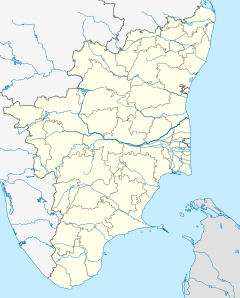| Dhandayuthapani Swamy Temple | |
|---|---|
 Dhandayathapani Swamy Temple atop the Palani Hills | |
| Religion | |
| Affiliation | Hinduism |
| District | Dindigul |
| Deity | Murugan |
| Festivals | |
| Location | |
| Location | Palani |
| State | Tamil Nadu |
| Country | |
| Geographic coordinates | 10°26′20″N 77°31′13″E / 10.438805°N 77.520261°E |
| Architecture | |
| Type | Tamil architecture |
| Creator | Bogar |
| Website | |
| palanimurugan | |
Dhandayuthapani Swamy Temple is a Hindu temple dedicated to Murugan situated atop a hillock amidst the Palani Hills in Palani, Dindigul district of Tamil Nadu. It is one of the Six Abodes of Murugan. The temple is managed by the Hindu Religious and Charitable Endowments Department of the Government of Tamil Nadu.
It is mentioned as Thiruaavinankudi in the Sangam literature Tirumurukāṟṟuppaṭai. As per Hindu mythology, the hillock was carried by Idumban from Kailasha on the orders of sage Agastya and was made to place it at the current location at Palani by Murugan. Later when sage Narada visited Shiva at Kailasha and presented him with gnana-palam (fruit of knowledge), Shiva decided to award it to whichever of his two sons finishes encircling the world thrice. Accepting the challenge, Murugan started his journey around the globe on his peacock mount but his brother Ganesha surmised that the world was no more than his parents Shiva and Shakti combined, circumambulated them and won the fruit. Knowing this, Murugan was furious as he felt cheated and chose to live a life as a hermit in Palani hills.
The idol of Murugan in the garbagriha is believed to have been consecrated by sage Bogar, one of the Siddhars, out of an amalgam of nine herbs known as Navapashanam. The temple was built between 2nd and 5th century CE by the Cheras and was expanded multiple times over the years by various kingdoms.
The temple complex atop the hillock can be accessed by foot by climbing the stairs or walking along a sliding way. Pilgrims can also reach the top via a winch operated railway or a rope car. Tonsuring is one of major traditions of the temple. All Murugan festivals are celebrated in the temple with special pujas and rituals. Pilgrims may carry a kavadi, a physical burden, as a form of debt bondage. The temple is synonymous with Panchamritam, a sweet mixture made of five ingredients, offered as a prasadam, which is a listed Geographical Indication.
